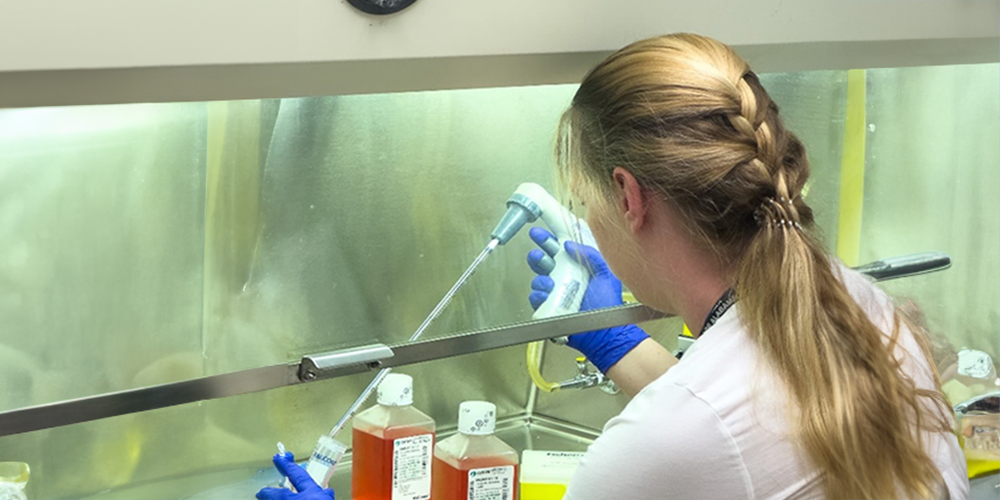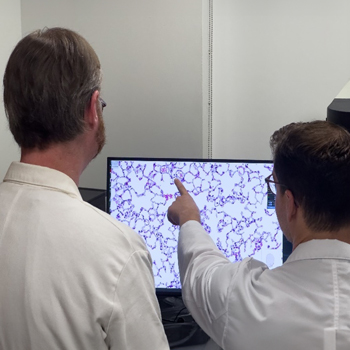The Lung Biology Program comprises a team of scientists focused on pioneering research in Pulmonary Medicine. Key areas of focus include protease and matrix biology, metabolomics and proteomics, structural biology, and clinical research.

To achieve our research goals, our program utilizes a wide range of experimental and analytical technologies, along with access to experimental samples. Our research encompasses the development of animal models such as the smoke mouse model of COPD, lung bacterial infection mouse model, lung cancer mouse model, and other genetically modified mice. We also engaged in the collection of clinical specimens including bronchoalveolar lavage fluid, biopsy samples, blood, and sputum. Additionally, we can leverage on-site metabolomics analysis through the Targeted Metabolomics and Proteomics Lab (TMPL), as well as NMR analysis through the Structural Biology Lab.
Our faculty members are located across various campuses, holding a majority presence in the Bevill Biomedical Research Building, Community Health Service Building 20th, and Pittman Biomedical Research II. Being centrally located in the UAB Health Sciences complex provides unique opportunities for collaborative research with many other basic and clinical investigators.
Protease and Matrix Biology
 Our program has expanded upon Dr. Gaggar's previous research themes, focusing on the mechanisms of matrikine regulation during acute inflammation (Gaggar et al, Cell 2019). These studies have provided critical understanding of the presence and importance of proteases and matrikines, refining our prior studies to focus on specific molecular mechanisms that these molecules impact during self-limited tissue injury and their association with specific disease phenotypes. The exploration of matrikine regulation within the context of lung disease has unfolded into a more complex and intricate field of study. This complexity has prompted us to delve into fundamental inquiries regarding the evolution and role of matrikines in shaping the immune response. We aim to discover how matrikine persistence drives the transition from acute to chronic inflammation. Learn more Protease and Matrix Biology research by visiting The Program in Protease and Matrix Biology and contacting Program Director Xin Xu, M.D., Ph.D.
Our program has expanded upon Dr. Gaggar's previous research themes, focusing on the mechanisms of matrikine regulation during acute inflammation (Gaggar et al, Cell 2019). These studies have provided critical understanding of the presence and importance of proteases and matrikines, refining our prior studies to focus on specific molecular mechanisms that these molecules impact during self-limited tissue injury and their association with specific disease phenotypes. The exploration of matrikine regulation within the context of lung disease has unfolded into a more complex and intricate field of study. This complexity has prompted us to delve into fundamental inquiries regarding the evolution and role of matrikines in shaping the immune response. We aim to discover how matrikine persistence drives the transition from acute to chronic inflammation. Learn more Protease and Matrix Biology research by visiting The Program in Protease and Matrix Biology and contacting Program Director Xin Xu, M.D., Ph.D.
Metabolomics and Proteomics; System Biology
 Our program advances our understanding of systems biology by integrating transcriptomics, proteomics, and metabolomics, leveraging AI technology for detecting and predicting specific chemical compounds in biological samples. Furthermore, we plan to develop single-cell proteomics in the near future, which will enable us to study proteomic profiles at the resolution of individual human cells.
Our program advances our understanding of systems biology by integrating transcriptomics, proteomics, and metabolomics, leveraging AI technology for detecting and predicting specific chemical compounds in biological samples. Furthermore, we plan to develop single-cell proteomics in the near future, which will enable us to study proteomic profiles at the resolution of individual human cells.
Targeted Metabolomics and Proteomics Lab (TMPL)Utilizing cutting-edge on-site metabolomics analysis from the Targeted Metabolomics and Proteomics Lab (TMPL), equipped with advanced instruments like the SCIEX 7600 ZenoTOF Mass Spectrometer and M5 Microflow-Liquid Chromatography system, the program significantly enhances research capabilities in various fields, such as metabolomics, proteomics, glycomics, and targeted small molecule analysis. Additionally, the facility houses a suite of other advanced SCIEX instruments: a triple quadrupole SCIEX 4000, a quadrupole-linear ion trap SCIEX 6500 Qtrap, and a hybrid-quadrupole-TOF SCIEX 5600 TripleTOF. The SCIEX 7600 ZenoTOF is particularly powerful for comprehensive and targeted proteomics, lipidomics and metabolomics. The combination of M5 Microflow LC and Exion UPLC with the new mass spectrometer provides the highest possible sensitivity for sample analysis; in addition, the Electron Activated Dissociation (EAD) feature is important for further compound structural elucidation. This robust array of technologies underscores TMPL's leading-edge capabilities in detailed molecular analysis.
Learn more about the Metabolomics and Proteomics research by contacting Stephen Barnes, Ph.D., Landon Wilson, Ph.D, or Kyli Blagburn.
Structural Biology
Modern biological sciences have been revolutionized by advancements in structural biology, driven by techniques like electron microscopy (EM), X-ray crystallography, and nuclear magnetic resonance (NMR). The integration of artificial intelligence (AI) systems, AlfaFold, which predict protein structures from amino acid sequences, has further accelerated this transformation. These methodologies, combined with modern biophysical approaches, provide scientists with unprecedented insights into biological phenomena at the molecular scale.
Our program leverages these advanced disciplines to tackle a wide range of biological challenges. Our faculty are pioneers in the application of these revolutionary techniques, leading the charge in unraveling the complexities of lung biology. Through this expertise and cutting-edge technology, our program significantly contributes to our understanding of fundamental biological processes and their implications for human health. Read more about Structural Biology at UAB by visiting the Structural Biology and Biophysics Research website.
Learn more about the Structural Biology research by contacting Chad Petit, Ph.D. or Todd Green, Ph.D..
Clinical Research
Our program consists of clinicians and scientists specializing in pulmonology, pathology, immunology, pediatrics, and cardiovascular medicine. They engage in clinical trials, conducting both large multicenter and single-center, investigator-initiated research on lung diseases such as cystic fibrosis, COVID-19, asthma, COPD, and interstitial lung disease. The program serves as an interdisciplinary hub designed to accelerate the understanding of lung biology by translating basic science discoveries into clinical applications.
The Lung Health Center
 The clinical research of the Lung Biology Program is conducted within the UAB Lung Health Center (LHC), where Dr. Gaggar is the Scientific Director. The LHC, UAB's primary center for clinical and translational lung disease research, spans three campus locations with over 22,200 square feet of research space and a team of over 30 staff members, including research nurses, respiratory therapists, budget and regulatory specialists, research scientists, administrative staff, and students. The LHC focuses on research, education, and patient care, promoting innovation, translation, and dissemination of new biomedical and informational technologies. The center is dedicated to benefiting patients and the community, advancing knowledge about lung disease mechanisms and therapies, educating the public, training future specialists, and engaging in patient care initiatives using evidence-based disease management approaches.
The clinical research of the Lung Biology Program is conducted within the UAB Lung Health Center (LHC), where Dr. Gaggar is the Scientific Director. The LHC, UAB's primary center for clinical and translational lung disease research, spans three campus locations with over 22,200 square feet of research space and a team of over 30 staff members, including research nurses, respiratory therapists, budget and regulatory specialists, research scientists, administrative staff, and students. The LHC focuses on research, education, and patient care, promoting innovation, translation, and dissemination of new biomedical and informational technologies. The center is dedicated to benefiting patients and the community, advancing knowledge about lung disease mechanisms and therapies, educating the public, training future specialists, and engaging in patient care initiatives using evidence-based disease management approaches.